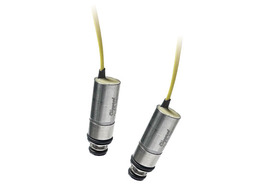Micro Proportional Valves for Automotive Fuel Cells
As fuel cell technology continues to evolve, optimizing gas flow regulation becomes a critical challenge for achieving greater efficiency and performance in automotive applications. Micro proportional valves offer a compact, reliable solution for precisely controlling gas flow in these types of systems.
As the automotive industry transitions towards cleaner energy sources, fuel cells have emerged as a promising alternative to traditional combustion engines. Precision control of gases such as hydrogen and air is essential for fueling electrochemical reactions. Therefore, micro proportional valves can be a critical component for enhancing the performance, efficiency, and safety of automotive fuel cell systems.
Precision and Efficiency in Fuel Cells
Fuel cell systems operate by combining hydrogen with oxygen from the air to generate electricity. However, this process demands highly precise gas flow regulation. Any fluctuation can affect performance, efficiency, or safety. Micro proportional valves can be used to regulate hydrogen supply to the fuel cell stack with precision, ensuring optimal flow rates that prevent gas overuse and minimize leakage. These valves can also be used to modulate air intake, maintaining the correct ratio of hydrogen to oxygen for efficient power generation. Additionally, they can assist in water management by controlling vapor or liquid flows, helping to mitigate water buildup, which is crucial for sustaining the overall efficiency and performance of the fuel cell system.
Key Challenges Include:
• Precision control of hydrogen and air flow to optimize fuel cell stack performance
• Minimization of leakage to ensure hydrogen is used efficiently
• Compactness in a system where space is at a premium
• Reliability in a system where mechanical failures are costly
Micro proportional valves such as Clippard’s 8 mm PV series provide an ideal solution to the needs of fuel cell applications due to their compact design, precision flow control, low power consumption, and exceptional durability.
Compact Design
The small size (8 mm) of Clippard’s PV series valve allows for integration into tight spaces, making it ideal for automotive applications where every millimeter matters. This compactness also contributes to the overall weight reduction, which is critical in electric and hydrogen-powered vehicles to maximize efficiency.
Precision Flow Control
The PV series proportional valve provides smooth and continuous control of gas flow, enabling the fine-tuning necessary for the fuel cell’s delicate operations. The precision of flow modulation ensures that the right amounts of hydrogen and air are introduced at the right time, maximizing efficiency and output while minimizing waste and by-products.
Low Power Consumption
In fuel cell applications, energy efficiency is paramount. The PV series has low power requirements, which helps minimize the overall energy consumption of the system. This characteristic is particularly important in battery-electric fuel cell vehicles, where conserving energy is crucial to extending vehicle range.
Exceptional Durability
Automotive environments are harsh, with wide temperature variations, vibrations, and exposure to chemicals. The PV series valve is designed with a durable stainless steel body and Clippard’s renowned Spider Technology to withstand these conditions, ensuring longevity and consistent performance under strenuous conditions.
As fuel cell technology evolves, so does the demand for highly reliable, efficient, and compact components. Clippard’s PV series proportional valve offers a perfect balance of precision, durability, and energy efficiency, making it an essential component in the quest for more sustainable automotive powertrains.
|
Related Products |
||||
PV Series Micro Proportional Valve |
||||






